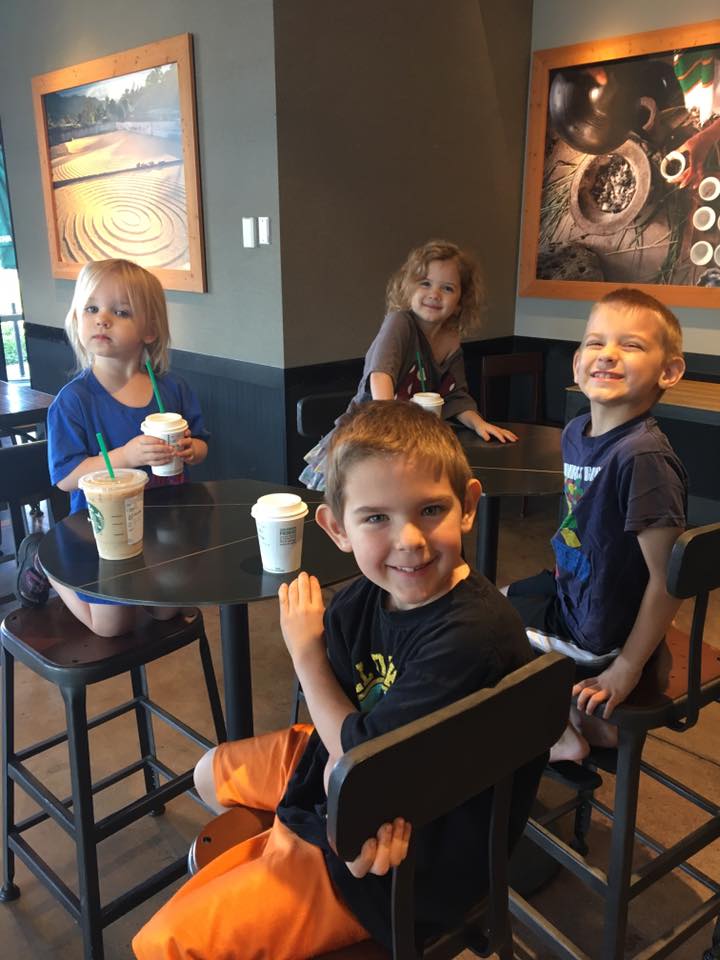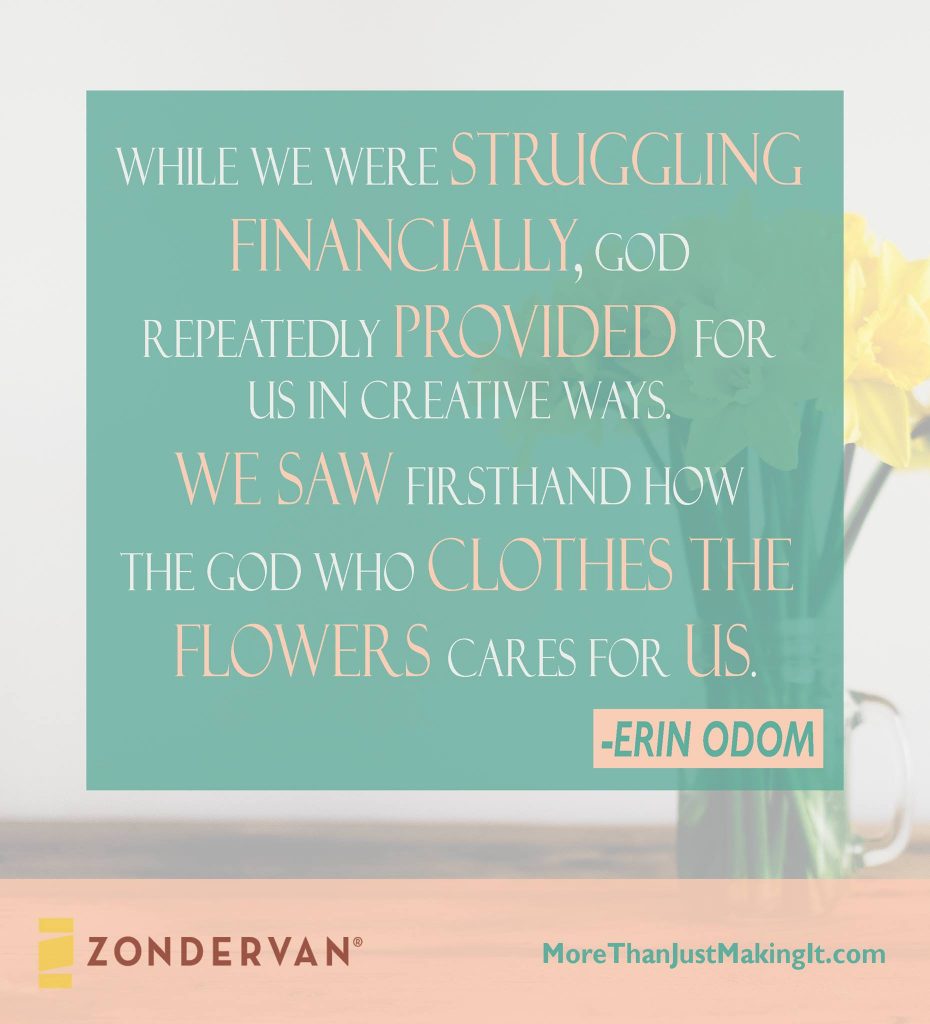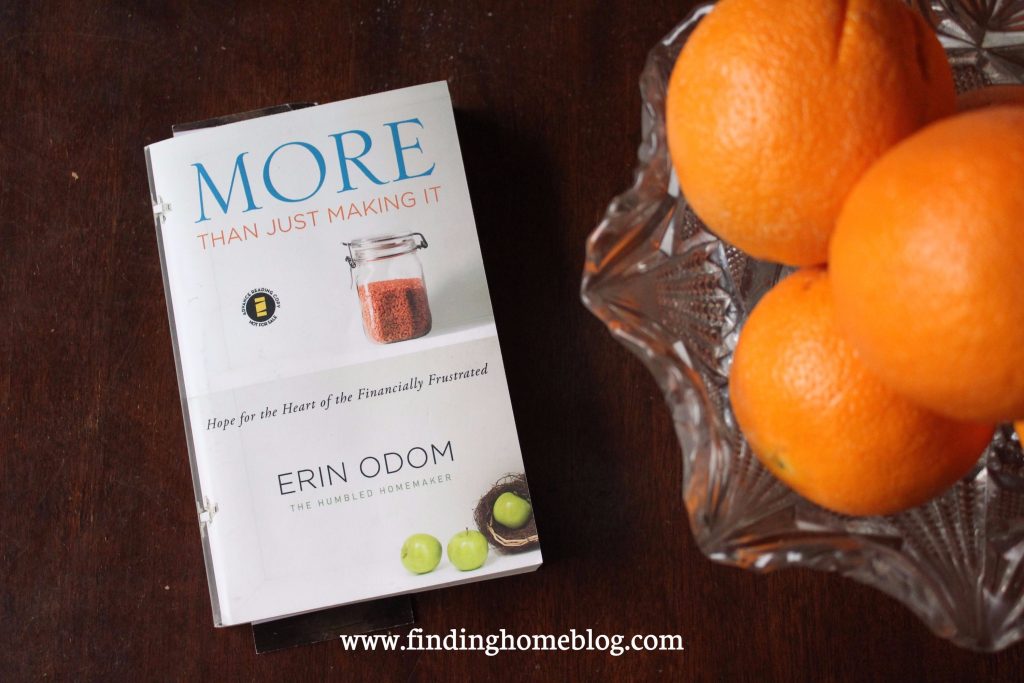As I read through the first few pages of a new book, I thought to myself, “I could have written this.”
“I smiled and feigned confidence as I began to tell our story. All the while, I wanted to scream from the rooftops that I shouldn’t be there at all. That I was an educated woman. That I’d always paid my taxes and been a straight-A student in school – the valedictorian of my high school class and named “Most Outstanding Female Graduate” at my college graduation. That I was a hard worker. That I wasn’t a lazy bum. That I was above the stereotypes. That I was above this. None of it mattered. So instead, I told the truth. ‘I’m here to apply for food stamps.'”
Right in the first chapter of her new book, Erin Odom was already telling a story that I could very much relate to. And it’s a story that many people have, but not many people tell.
The truth is, our family isn’t in debt because of things going wrong or some big emergency or even a national event like the housing crisis or the recession. We are in debt because of choices we made earlier in our lives – to take out extra student loans during college instead of working, to charge purchases on credit cards instead of saving for them.
While we might know quite a bit more about money and finances now, that doesn’t change the decisions we made in the past.
And while we work on getting out of debt, sometimes that means being in places we didn’t think we’d end up. Like applying for food stamps. Or sitting in the WIC office for another appointment. Or filling out forms for state health insurance because our bank account doesn’t have enough for labor and delivery costs for our fifth child.
If you had asked me about these things while I was in college, I would have told you that they were nice services, but of course they weren’t for us. Just as Erin started out with preconceived judgments about the people who use these services, I was the same way. And now that I use those services myself, I run into those stereotypes time and time again. And sadly, I still sometimes catch myself making snap judgments about these people I don’t know.
But I also find myself wondering: why are you here? What circumstances in your life brought you to this point, that you’re using these services? Is it temporary? Are you going through some hardship and just need a bit of help? Do you have a chronic issue that makes this your lifeline? Of course, I’m not brave enough to actually ask these questions. Even if I weren’t the introvert that I am, there seems to be this unspoken rule whenever you go to WIC appointments that you don’t talk to each other in the waiting room.

Even now, as I tell part of our story, I feel like I have to defend myself to all of you. Because I post pictures of Starbucks coffee cups fairly regularly, and as someone using assistance, someone trying to get out of debt, what kind of hypocrite am I? I feel like I need to tell you that 90% of my budgeted fun money for the month goes toward Starbucks treats, because that’s what I enjoy. And that makes it okay, because it’s in the budget. I shouldn’t have to explain myself, but I want people to know that I’m not abusing the system, that I’m doing the best that I can.
When I’m in the WIC office and they’re going through their nutrition information, as they are required to do, and as I’m sure is helpful for some of the people they see, I sometimes find myself getting frustrated. I’m a cookbook author and real food advocate. I don’t need this advice! I know what healthy food is.
Except that I still struggle with eating properly and emotional eating and losing weight. And I’m not always the best example for my children when it comes to food. So maybe as I work through my own issues there, I need to take a step back and realize that they’re just doing their jobs and the information can actually be helpful. I’m just as guilty of judging as anyone else.
Guilt. Embarrassment. Thankfulness. Shame. Relief. Curiosity. Frustration.
If I have this many varied and conflicted feelings about using assistance while I’m on it, I can only imagine the myriad feelings out there for those not directly involved.
There aren’t just negative feelings involved in this journey.

“While we were struggling financially, God repeatedly provided for us in creative ways. We saw firsthand how the God who clothes the flowers cares for us (Matthew 6:28).”
Remember a few weeks ago when I shared about a natural toothpaste brand? We were just about out of toothpaste when that very generous blogger kit came in the mail. A few years ago, one of our vehicles needed new tires, which at around $500 was a pretty hefty expense. That same week my husband received a gift of $500 from someone who simply wanted to bless and encourage our family.
God doesn’t always provide for us in the ways we expect, but He always provides.
“Our family would learn to trust God during a season of need. It had been easy to trust Him when we weren’t in want. Now that we were, God was cultivating in us a deeper faith, a stronger trust in His provision.”
The truth is, it’s easy to make judgments and broad, sweeping statements when everything is easy. But those moments when it’s not so easy are the moments that refine us, that point us deeper into God’s Word and toward trusting Him to provide for us.

“When we live by the philosophy that we have earned and are entitled to our possessions, we’re more likely to hold onto them tightly rather than to share them freely. When we remember that all things come from the Lord, it’s easier to hold His blessings with open hands and give generously.”
I’m not perfect at this by any means, but as we’ve been continuing to declutter and get rid of things that aren’t adding value to our lives, it’s been fun for me to be able to bless others with those things. I passed my breast pump on to a first time mom. We sent some books and toys to a family who lost many of their belongings due to lead contamination.
Sure, we’ve donated plenty to the thrift store, but how much more meaningful to be able to give things to people personally, who are thankful for the gifts? To be able to be on the giving end of the spectrum, even when we more frequently receive help, is its own kind of blessing.

Recently, I read a book. And it made me think. And it made me question. And it made me want to do better. And since this book did all these things for me, I wanted to share some of my thoughts with you. Things I keep coming back to, even after moving on to other books. More Than Just Making It comes out today, and I highly recommend it.
Whether you’re struggling financially or you’ve been blessed monetarily (or anywhere in between), this book will remind you not only Who provides for us, but also give you some practical advice and hope to move from barely making it to more than just making it.
Photo credit: all quotation images are from Zondervan, used with permission.
Disclosure: Some of the links in this post are affiliate links. If you make a purchase through these links, I receive a bit of a commission at no additional charge to you. Thank you for your support!
Related Posts:
[…] Most Relatable Memoir: More Than Just Making It by Erin Odom […]